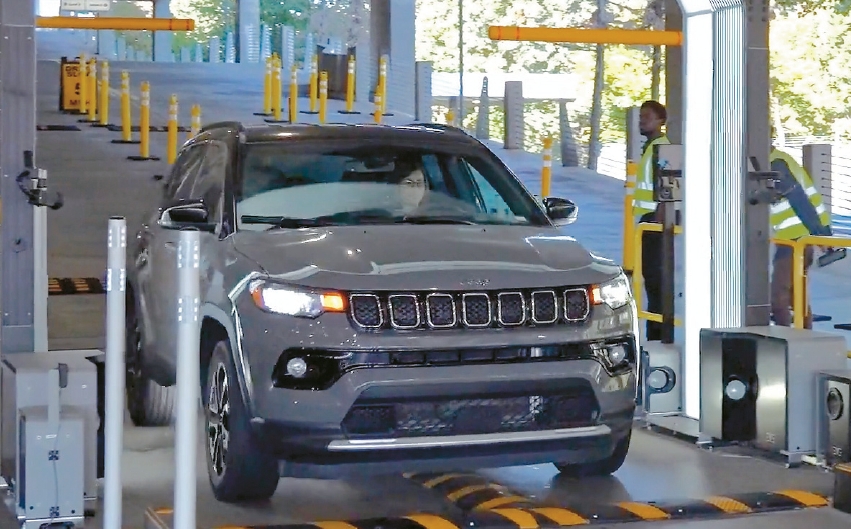Hertz has introduced an AI-powered vehicle damage detection system at major U.S. airports, prompting complaints from customers who say they were charged high fees without their consent. The system automatically identifies small damages—even those difficult to detect with the human eye—raising concerns about fairness, transparency, and customer rights.

The technology was first deployed last fall at Atlanta Hartsfield-Jackson International Airport and is now operating at six locations: Atlanta, Newark, Charlotte, Phoenix, Tampa, and Houston. The system uses high-resolution scanners to capture thousands of images before and after vehicle rental and compares them to detect new damage.
Customers have reported being billed for minor issues automatically flagged by the AI system. One renter was charged $440 for a one-inch tire scratch, sparking widespread criticism.
Another recent case involved Kelly Rogers, a New York resident who returned a Hertz vehicle at Atlanta Airport on July 4. She later received a bill for $195 through the Hertz app—$50 for repairs and $115 listed as a “detection and processing fee.” Rogers said, “There was no visible damage, and the staff said nothing.” However, Hertz upheld the charge, citing the AI system’s assessment.
Critics say these fees are being imposed without customers’ informed agreement.
Hertz stated that charges are applied in fewer than 3% of all rentals, and that reports are re-reviewed by staff if a customer disputes the fee. Still, damage assessments are initially handled entirely by AI, and the company has not disclosed how fees—particularly the detection charges—are calculated.
Consumer advocates argue that Hertz is passing on the cost of operating the AI system to customers without clear justification.
One consumer protection representative said, “Charging for detection costs in addition to repair fees is effectively double billing. Imposing charges without review or consent from involved parties could constitute an unfair contract clause.”
The technology was developed by UVeye, which claims its scanners can detect five times more damage than human inspectors and result in up to six times more total assessed damage.
Other rental companies have taken different approaches. Sixt uses an AI scanner system called Cargate but combines it with a manual photo review process. Meanwhile, Avis and Enterprise still rely exclusively on human inspections.
Hertz plans to expand its AI system to additional airports later this year, though it has not disclosed specific dates or locations.
BY YOONJAE JUNG [jung.yoonjae@koreadaily.com]
![Troublesome delivery robots damage gardens, snarl streets Delivery robots in urban areas including LA Koreatown and Hollywood have been involved in a string of incidents, blocking fire engine responses, crossing police lines at active scenes, and colliding with homes and motorcycles. [KTLA • Reddit capture]](https://www.koreadailyus.com/wp-content/uploads/2026/02/0226-delivery-robot-compile-100x70.jpg)
![Nonprofit leaders accused of diverting millions meant for the vulnerable Judy Baca, who faces allegations of embezzling $5 million, participates in work on “The Great Wall of Los Angeles” mural in 2023. [Sangjin Kim, The Korea Daily]](https://www.koreadailyus.com/wp-content/uploads/2026/02/0226-nonprofit-1-100x70.jpg)
![Family of army veteran killed in San Antonio shooting launches fundraiser A screenshot of the GoFundMe fundraising page created for Kyung Chang Lee. Donations are being collected to support the family of Lee, who was killed in the San Antonio, Texas, shooting. [GoFundMe capture]](https://www.koreadailyus.com/wp-content/uploads/2026/02/0225-KyungChangLee-100x70.jpg)
![Cartel leader’s killing sparks unrest, prompts Koreans to reconsider Mexico trips Downtown Guadalajara in Mexico’s state of Jalisco, which resembled a war zone on February 22 amid arson and other violence by drug cartel members, appears quiet on February 24. The area, usually crowded with tourists and residents, saw a sharp decline in foot traffic and public transportation use. [Pablo Lemus Navarro/X account]](https://www.koreadailyus.com/wp-content/uploads/2026/02/0225-Mexico-100x70.jpg)